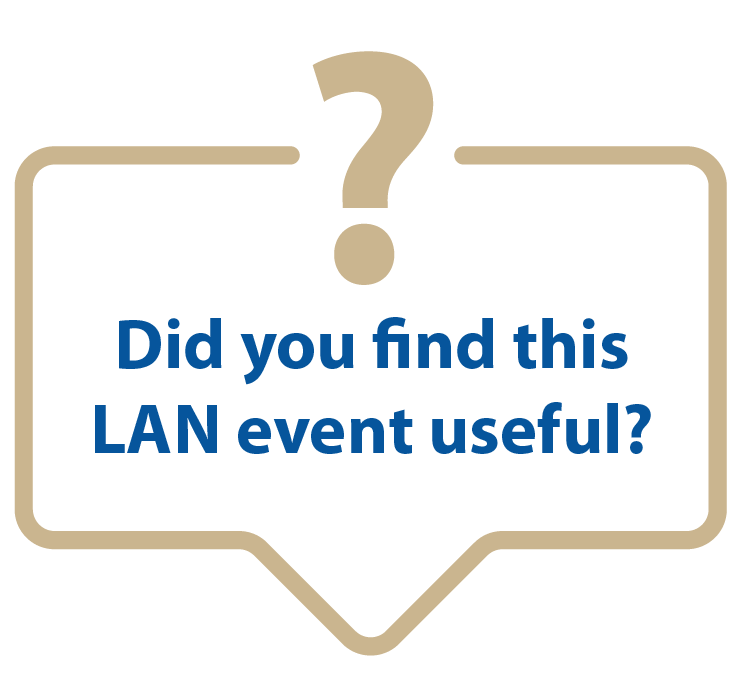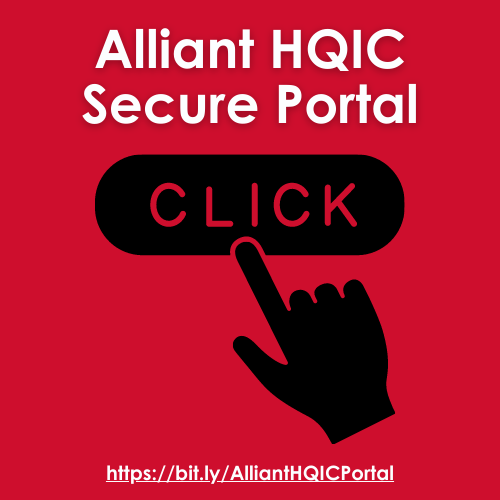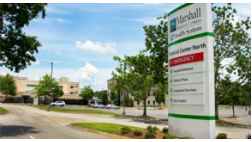|
|
|
|
This monthly newsletter highlights the latest insights, resources, and evidence-based best practices.
Our hope is that this newsletter makes it easy for you to stay on top of trends and allows you to provide the best possible care for those you work with and serve.
|
|
|

Medicare Promoting Interoperability Program New Resources for 2022
In the Fiscal Year (FY) 2022 Inpatient Prospective Payment Systems (IPPS) for Acute Care Hospitals and the Long-Term Care Hospital (LTCH) Prospective Payment System (PPS) Final Rule, CMS adopted changes and new requirements for the Medicare Promoting Interoperability Program for eligible hospitals and critical access hospitals (CAHs). CMS created resources to help hospitals understand these changes and successfully participate during the calendar year (CY) 2022 reporting period. Click here for the resources.
|
HQIC Patient Safety Cohorts
Alliant HQIC is creating patient safety cohorts of hospitals based on performance. If selected, your hospital is encouraged to participate in two, or possibly three, cohorts over the next six months. Our subject matter experts, partners and quality improvement advisors will provide education and one-on-one coaching for your hospital teams. Alliant will hold kick-off calls in May and June to provide an overview and timeline and describe action periods for the cohorts. Stay tuned for more information.
Alliant HQIC Quality Leader Summit
Tuesday, June 14, 2022, at 1 p.m. ET (60 min.)
The Alliant Hospital Quality Improvement Contractor (HQIC) team will discuss updates based on the 18-month goals and accomplishments for our 150 enrolled hospitals. The Alliant HQIC team and partners will discuss the new patient safety cohorts, as well as revised coaching packages and educational opportunities, including webinars and bite-size learning videos. A demonstration of hospital data and graphs on the Hospital Portal will also be provided.
Objectives:
- Discuss a review of 18-month goals and performance to date
- Describe the new patient safety cohorts and coaching packages
- Discuss upcoming educational and networking opportunities including bite-size learning videos
- Provide a demo of the Hospital Portal including data/trending, assessments and discussion boards
Register Here
Upcoming Learning and Action Network (LAN) Events
Infection Prevention: Words of WISDOM (What I Should Do on Monday)
Tuesday, May 24, 2022, at 2 p.m. ET (30 min.)
Join this motivating presentation and discussion to learn from infection preventionists who will offer their insights from years of experience in health care. There can be a steep learning curve for infection preventionists new to the role or starting out in their careers. Learn from a collective group who will offer their words of wisdom that can be put into action to assist in your hospitals’ infection prevention and performance improvement of patient care.
Learning Objectives:
- Learn actionable insights from experienced infection preventionists
- Gain a better understanding of surveillance techniques and data reporting
- Provide up-to-date infection prevention guidelines and resources
WALK with the WOC and Step into a Brighter Future of Pressure Injury Prevention
Recorded on April 26
In this presentation, participants learned how one hospital’s leadership support helped transform the role of the Wound, Ostomy and Continence (WOC) nurse to own patient outcomes related to skin care and reduce hospital-acquired pressure injuries (HAPI).
Watch Recording | View Slides
View All Upcoming Events Here

If Yes, Click Below.
Click here if you attended the April LAN event and were able to "use tomorrow" what you heard during the webinar.
View All Previous LAN Event Recordings
Community of Practice (CoP) Calls
CMS hosts CoP calls on the second Thursday of each month at 1 p.m. ET | 12 p.m. CT | 11 a.m. MT | 10 am. PT. The calls are open to all Alliant HQIC hospitals.
CLABSI Control and Reduction Efforts During the COVID-19 Pandemic
Thursday, May 12
Join Health Services Advisory Group and the HQIC community as we summarize the impact of COVID-19 on CLABSI, discuss lessons learned, and review the importance of CLABSI best practices with facility-specific examples of how to control device utilization, bundle compliance and associated infections.
Register Here
Reducing the Health Disparities Gap: A Practical Framework for Promoting Health Equity in Your Hospital
Recorded on April 14
View Slides and Recording
HQIC Quality Improvement Series
Alliant Health Solutions hosted a three-part series focused on quality improvement models and tools, process improvement, and developing a quality improvement team. Check out the slides and recordings on the Alliant website.
Session 1: Thursday, Feb. 3, 2022 – View Slides | View Recording
Session 2: Thursday, March 3, 2022 – View Slides | View Recording
Session 3: Thursday, April 7, 2022 – View Slides | View Recording
COVID Office Hours-IP Chat
Alliant Health Solutions hosts this chat on the 2nd and 4th Wednesday of every month from 2-2:30 p.m. ET.
Alliant is aware that infection preventionists (IPs) are under pressure to ensure the organizations they serve are aware and responding to ever-changing requirements. In our rural and critical access hospitals, many IPs have limited time to stay up-to-date on the information needed to implement effective control measures and sort through new information as science evolves. In these chats, IPs discuss their challenges and solutions. For more information, visit the Alliant website. preventionists (IPs) are under pressure to ensure the organizations they serve are aware and responding to ever-changing requirements. In our rural and critical access hospitals, many IPs have limited time to stay up-to-date on the information needed to implement effective control measures and sort through new information as science evolves. In these chats, IPs discuss their challenges and solutions. For more information, visit the Alliant website.
No registration is required.
Join by phone: 646-992-2010 Access code: 2337 284 8005
WebEx link: COVID Office Hours-IP Chats
NHSN Bite-Sized Learning Videos
Alliant HQIC developed a series of bite-sized learnings to assist hospital infection preventionists with some of the most frequently asked questions regarding the National Healthcare Safety Network (NHSN) database. Topics covered include annual surveys, monthly reporting plans, adding new users or changing the facility administrator, facility mapping, data entry, and analysis. Watch the Videos | Download Flyer
|
 Alliant HQIC Online Portal Alliant HQIC Online Portal
Access the Alliant HQIC portal to view your assessments and measurement data, and chat with other HQIC-enrolled hospitals to share best practices, barriers and solutions. Download Portal Instructions to Get Started
Check In: How Are We Doing?
Alliant HQIC wants to hear from you! Please click here to share feedback with us.
Behavioral Health/Opioid Stewardship
Risk Factors for Opioid-Related Adverse Drug Events Among Older Adults After Hospital Discharge
The Journal of the American Geriatrics Society published a retrospective cohort study of a national sample of Medicare beneficiaries aged 65 years and older, hospitalized for a medical reason, with at least one claim for an opioid within two days of hospital discharge. Hospice care and patients admitted from or discharged to a facility were excluded. Researchers used administrative billing codes and medication claims to define potential opioid-related ADEs within 30 days of hospital discharge and competing risks regression to identify risk factors for these events. Read the Study
Patient Safety
All-Cause Harm
All-Cause Harm Trigger Tool
We know that positive safety culture, engaged employees, and satisfying patient experiences reduce all-cause harm. We also know that harm is underreported and under-detected. The 2012 Office of Inspector General report noted hospital staff did not report 86% of events to incident reporting systems, partly because of staff misperceptions about what constitutes patient harm. How does your facility’s safety plan define harm? What education does your staff receive on what constitutes an event that should be reported? How does your facility detect harm? Consider the use of a trigger tool. Triggers are screening tools that signal the need for a more intense record review to determine if harm occurred.
Resources:
Institute for Healthcare Improvement, Trigger Tools
AHRQ: Triggers and Trigger Tools
OIG report: Hospital Incident Reporting Systems Do Not Capture Most Patient Harm
Developing and Evaluating an Automated All-Cause Harm Trigger System
Adverse Drug Events
Early Prescribing Outcomes After Exporting the Equipped Medication Safety Improvement Program
Prescribing potentially inappropriate medications (such as antihistamines, benzodiazepines, and muscle relaxants) can lead to adverse health outcomes. The Enhancing Quality of Prescribing Practices for Older Adults in the Emergency Department (EQUIPPED) program is a multicomponent intervention intended to reduce potentially inappropriate prescribing among older adults who are discharged from the emergency department. Twelve months after implementation at three academic health systems, the EQUIPPED program significantly reduced overall potentially inappropriate prescribing at one site; the proportion of benzodiazepine prescriptions decreased across all sites. Read More
Safety and Efficacy of Different Prophylactic Anticoagulation Dosing Regimens in Critically and Non-Critically Ill Patients with COVID-19
A systematic review provided comprehensive and high-quality evidence for the use of standard-dose prophylactic anticoagulation over an escalated-dose regimen as routine standard of care for hospitalized patients with COVID-19 who do not have an indication for therapeutic anticoagulation, irrespective of disease severity. Read the Study
Antibiotic Stewardship
Toolkit for Decolonization of Non-ICU Patients with Devices
A toolkit created by the Agency for Healthcare Research and Quality (AHRQ) can help hospital infection prevention programs implement a decolonization protocol that was found to reduce bloodstream infections by more than 30% in adult inpatients who were not in intensive care units (ICUs) and who had specific medical devices. It includes implementation instructions, demonstration videos, and customizable tools. Get Toolkit
Health Care-Associated Infection
Toolkit for Preventing CLABSI and CAUTI in ICUs
Today’s intensive care unit (ICU) teams understand the importance of providing high-quality care that relies on a culture of safety and evidence-based clinical practices to help prevent infections. The AHRQ created a customizable, educational toolkit aims to help ICUs reduce rates of central line-associated bloodstream infection (CLABSI) and catheter-associated urinary tract infection (CAUTI). Get the Toolkit
CLABSI Update to SHEA Compendium
Updates to the previously published guidelines provide recommendations for CLABSI prevention in acute care hospitals. This expert guidance is sponsored by the Society for Healthcare Epidemiology, Infectious Diseases Society of America, the Association for Professionals in Infection Control and Epidemiology, the American Hospital Association and The Joint Commission. Originally published in 2014, the updates consider new evidence including recommendations that have been added, removed or altered. Read More
NHSN
NHSN New IP Checklist
To help manage your National Healthcare Safety Network (NHSN) Patient Safety Component (PSC) training progress, NHSN created a checklist and divided it into the PSC’s different modules. For each NHSN PSC topic, access the specified training guide and review the related materials. All the materials are available on the NHSN website unless otherwise noted. Download the NHSN PSC Checklist
Pressure Injuries
COVID-19 Resources for Pressure Injury Prevention
The National Pressure Injury Advisory Panel (NPIAP) is an independent nonprofit professional organization dedicated to the prevention and management of pressure injuries. Click Here to read their paper "Unavoidable Pressure Injury during COVID-19 Pandemic: A Position Paper from the NPAIP."
NPIAP Tip Sheet for Pressure Injury Prevention
The NPIAP created a helpful tip sheet for prone positioning to prevent pressure injuries. Download Tip Sheet
Patient and Family Engagement
Guide to Patient and Family Engagement in Hospital Quality and Safety
Research shows that when patients are engaged in their health care, it can lead to measurable improvements in safety and quality. To promote stronger engagement, the AHRQ developed the Guide to Patient and Family Engagement in Hospital Quality and Safety, an evidence-based resource to help hospitals work as partners with patients and families to improve quality and safety. Read Strategy 1: Working with Patients and Families as Advisors
Health Equity
American Hospital Association Launches Health Equity Roadmap
The Health Equity Roadmap, which builds on the goals established by the National Call to Action to Eliminate Health Care Disparities and AHA’s #123forEquity Pledge, is designed to meet hospitals and health systems where they are on their equity journey. It includes customized resources and action plans, among other support tools, to guide organizations throughout the transformation process. To learn more, visit AHA’s Health Equity Roadmap webpage and watch the short video. Starting your Health Equity journey? Check out the Roadmap for Success: Implementing Equitable Care.
Announcing the CMS Framework for Health Equity
The CMS Office of Minority Health has released the CMS Framework for Health Equity. This Framework challenges us to incorporate health equity and efforts to address health disparities as a foundational element across all our work—in every program and across every community. Using five priority areas, CMS will use this framework to design, implement, and operationalize policies and programs to support health for all people served by our programs, eliminating avoidable differences in health outcomes experienced by people who are disadvantaged or underserved, and providing the care and support that our enrollees need to thrive. Read the CMS Framework for Health Equity
To ensure sustained progress through meaningful initiatives, CMS will convene industry stakeholders, including health care facilities, insurance companies, state officials and providers. The first of these convenings will take place this summer and focus on ways to improve maternal health outcomes experienced by pregnant and postpartum people. CMS and experts invite health care industry leaders to share best practices and commitments to strengthen maternal health. Learn More
Readmissions/Care Transitions
Top Challenges Impacting Patient Access to Health Care
Patient care access is not a reality for many patients across the country. Between appointment availability issues and troubles getting a ride to the clinician's office, patient care access has many associated challenges. PatientEngagementHIT.com outlines some of the top obstacles to patient care access and how some medical professionals are addressing them. Read the Article
Mapping Medicare Disparities Tool
Chronic diseases pose a significant problem in the United States, resulting in substantial morbidity, mortality, disability, and cost. The CMS Office of Minority Health designed an interactive map, the Mapping Medicare Disparities Tool, to identify areas of disparities between subgroups of Medicare beneficiaries (e.g., racial and ethnic groups) in health outcomes, utilization and spending. It is an excellent starting point to understand and investigate geographic, racial and ethnic differences in health outcomes. This information may be used to inform policy decisions and to target populations and geographies for potential interventions. Learn More
|
COVID-19 Care
Using the Comprehensive Hospital Pandemic Preparedness Checklist for COVID-19
The CDC Comprehensive Hospital Pandemic Preparedness Checklist can help position hospitals to be prepared to identify and treat cases of COVID-19, including a potential surge in cases, and how to prevent the spread of disease in their facility. View the Checklist
New Way for Medicare Beneficiaries To Get Free Over-the-Counter COVID-19 Tests 19
The Biden-Harris Administration announced that Americans with Medicare Part B, including those enrolled in a Medicare Advantage plan, now have access to Food and Drug Administration (FDA) approved, authorized or cleared over-the-counter COVID-19 tests at no cost. People with Medicare can get up to eight tests per calendar month from participating pharmacies and health care providers for the duration of the COVID-19 public health emergency. Read More
In addition, people with Medicare can get information by calling 1-800-MEDICARE and or visit the website. Medicare also maintains several resources to help ensure beneficiaries receive the correct benefits while also avoiding the potential for fraud or scams. More details—particularly on identifying scams due to COVID-19—can be found here.
COVID-19 Vaccine Resources
CDC Updates Vaccine Interval Guidance
An eight-week interval between first and second doses of COVID-19 mRNA vaccines may be optimal for some people 12 and older, according to CDC vaccination schedule guidance updated Feb. 22. Read More
Alliant Health Solutions COVID-19 Vaccine Resources
Curated resources and best practices to support long-term care facilities, clinics, providers, and staff as they navigate vaccine distribution. Alliant Health Solutions COVID-19 Vaccine Resources
NCRN COVID-19 Resources Alliant Health Solutions is a strategic partner in the Morehouse School of Medicine National COVID-19 Resiliency Network (NCRN) in mitigating the effects of COVID-19. For information on the NCRN or local, state and national resources, see the resources flyer. English | Spanish
|
Hospital Heroes
Patient Safety and Quality Award Winner Spotlight: Habersham Medical Center
 Congratulations to Habersham Medical Center in Demorest, Ga., on winning first place in the Hospitals With Less Than 100 Beds category for its project, Engaging the Patient Improves Patient Experience and Enhances Patient Safety, which led to improved patient care. The Georgia Hospital Association applauds Habersham Medical Center for working to enhance patient safety and ensure the best and safest care possible for its patients. Congratulations to Habersham Medical Center in Demorest, Ga., on winning first place in the Hospitals With Less Than 100 Beds category for its project, Engaging the Patient Improves Patient Experience and Enhances Patient Safety, which led to improved patient care. The Georgia Hospital Association applauds Habersham Medical Center for working to enhance patient safety and ensure the best and safest care possible for its patients.
Pictured Left to Right: Back row: Zoe Jenkins, Lab; Tinnelle Davey, ED; Rachel Lewallen, Quality; Samantha Ramey, OB; Valeria Lewis, DON. Front row: Beth Hester, ED; Kristina Adamson, Education; Karen Phillips, Acute Care Services, Priscilla Adams, Quality
|
Success Stories
Alabama Hospital Reduces 30-Day Readmissions
Marshall Medical Centers provides comprehensive
 |
|
Marshall Medical North
Guntersville, Ala. |
|
 |
|
Marshall Medical South
Boaz, Ala. |
|
inpatient and outpatient health care services for the residents of Marshall County and the surrounding area (population of about 125,000) with two hospitals: North, a 90-bed hospital located in Guntersville, Ala. and South, a 150-bed hospital located in Boaz, Ala.
Named by the Joint Commission as a "Top Quality Performer" among America's hospitals, Marshall Medical Centers has implemented risk reduction strategies to decrease 30-day readmissions, focusing on THA/TKA and COPD patients.
To keep readmission rates low for THA/TKA patients, the team implemented the following:
- Joint Academy - This 45-minute class reviews everything the patients can expect going into surgery and how to take care of themselves once they go home.
- In-house education - Prior to discharge, all the patients are visited by one of our case managers to discuss self-care management once they go home and ensure the patients know the time and date of follow-up appointments.
- Follow-up calls - Made three to five days post-discharge and two weeks post-discharge to ensure patients are following all discharge instructions and discuss any issues.
All COPD patients receive a visit from an RN Case Manager prior to discharge and receive the following resources:
- Zone Magnets - Three color-coded magnets that indicate how patients are feeling that day and specific instructions to follow.
- Educational Literature - Brochures to help educate patients on their disease and how to take care of themselves.
As of December 2021, Marshall Medical Center South has successfully deceased preventable readmissions and has met the 1% reduction target goal. Current data show an average rate of 11.2%, a decrease of 1.6% over the 2019 baseline (12.8%). Congratulations and good work! View the Community of Practice presentation
|
|
|
Connect with us!
    Click here if you'd like to share your corporate profiles with us and we'll connect with you!
Click here if you'd like to share your corporate profiles with us and we'll connect with you!
|
| |
Hospital Quality Improvement Project Collaborators


|
| |
|
Copyright © 2022, All rights reserved.
Our mailing address is:
Alliant Health Solutions
1455 Lincoln Pkwy
Suite 800
Atlanta, GA 30346
|
For more information about Alliant Health Solutions, visit the website: www.allianthealth.org
For questions or information about free technical assistance, please contact:
Share this email with a friend or colleague:  
|
|
|
|
|